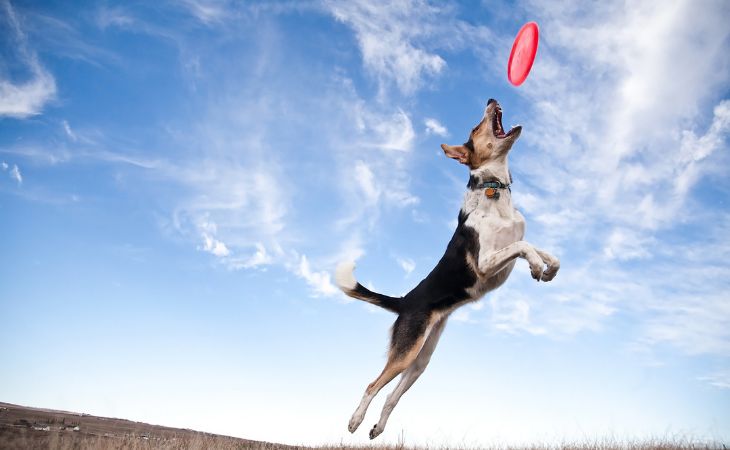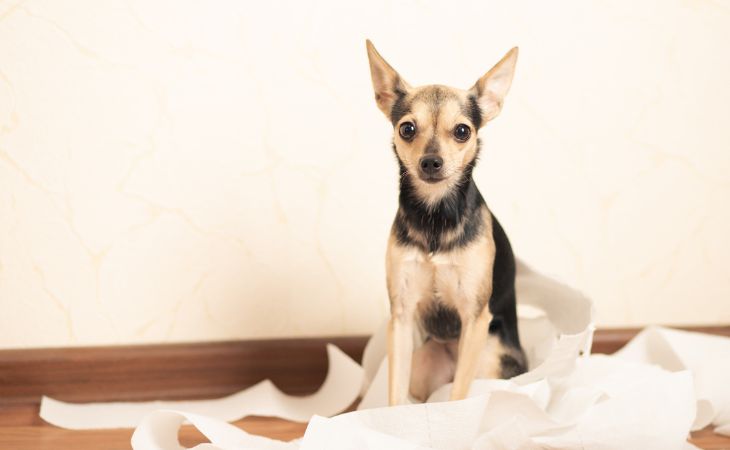Constipation and other digestive issues affect the quality of life of our canine friends. If you suspect your dog is constipated, keep a close eye on their symptoms and try to determine the cause to relieve their discomfort as quickly as possible. In this Letsgetpet article, we’ll help you recognize the main symptoms and causes of canine constipation.
What are the main symptoms of constipation in dogs?
Similar to humans, a constipated dog has difficulty eliminating their waste. You might notice that your dog is in pain every time they relieve themself. They might also groan or have tears in their eyes. A constipated dog’s stool is harder, drier, and darker than usual. In some cases, there could be a presence of mucus or blood in your dog’s stool.
If your dog is pooping less than they usually do, it could also be a sign that your dog is constipated. Generally, dogs poop at least once or twice a day. If they are constipated, they will struggle to do so for more than 24 hours and only eliminate a small amount of faeces. Other signs that might show that your dog is constipated is weight loss, dehydration, an uncomfortable or bloated appearance, vomiting, unusual fatigue, an arched posture, or a loss of appetite.
Possible causes of constipation
The possible causes of constipation are numerous and diverse. In most cases, they are caused by difficulty digesting food that isn’t rich enough in fiber. Your dog could have also ingested a foreign object such as a rock, piece of fabric, or a part of a shoe.
In addition, constipation can be caused by dehydration, not enough physical activity, or getting older. They are many other factors that could also cause a dog to be constipated, such as cancer, hyperthyroidism, or kidney or liver failure.
How do I relieve my dog’s constipation?
There are many ways to improve your dog’s stool transit and relieve their constipation. However, the remedies and solutions can vary depending on the severity of the constipation (benign, acute, or chronic).
Increase your constipated dog’s water intake
The first solution to help your constipated dog feel better is to make sure that they are well-hydrated. If the constipation is caused by dehydration, your dog will need a lot of water to feel better. Staying well-hydrated will help lubricate their intestines, liquefy their stool and facilitate the evacuation.
Ensure that your constipated dog has access to a lot of fresh water. You can place multiple bowls of water around the house, especially in areas where your dog spends a lot of time. If your dog doesn’t like drinking water, give them a lot of attention when they do drink. This will help them understand that drinking water is a good habit.
Another possibility is to add some bone broth or chicken broth to their food or water. This will increase the palatability of their water and food. You can also add a teaspoon of ginger to the water to calm their stomach. If they like ice, you can also give them some. All of this will allow you to increase your dog’s water intake.
Provide your constipated dog with high-fiber food
Fiber helps improve bowel transit. This is because it brings water into the stool that is blocked in their intestines. This water helps soften the stool and allow for an easier evacuation. When faced with canine constipation, a high-fiber diet can be beneficial for you dog. Prioritize fruits and vegetables that are good source of insoluble fibers. They also have high water content, which can keep your constipated dog hydrated.
For example, you can add boiled vegetables such as zucchini to your pet’s food. Other sources of fiber that you can add to your dog’s meals are mashed pumpkin, aloe vera juice, psyllium seeds or green leafy vegetables.
Give your dog liquid paraffin
Liquid paraffin produces a lubricating effect when inside a dog’s body. It also softens the stool. This is a useful solution to relieve your constipated dog’s discomfort, especially if the constipation is benign or temporary. Add a small quantity of liquid paraffin to their food 3 times per day. You can start by putting 1 ml of liquid paraffin for every 4.5 kg (≈ 9.9 lb) of your dog’s weight. You can then adapt the dose based on the effects and your dog’ needs.
Give your dog a dose of lactulose
Lactulose is a medicine that is also known as galactofructose. It is an osmotic laxative. In your dog’s intestines, it decomposes to produce acids that attract water. This softens the stool and increases the volume in the intestines. Therefore, they can be evacuated out of the system more easily. You can purchase this medicine at a pharmacy without a prescription, but you can still ask for a pharmacist’s advice.
Increase your dog’s physical activity
Frequent exercise helps food to be better transmitted through the bowels. The movement your dog makes when they take part in physical activities stimulates rhythmic muscle contractions in the small intestine and the colon. These contractions help the stool pass through the gastrointestinal tract.
An active dog will have better intestinal transit and less constipation problems. To help prevent constipation, increase the amount of time you spend outside on your walks or play time. You can also propose activities such as canicross, frisbee, or agility tto keep your dog active.

Add apple cider vinegar to your constipated dog’s food
Apple cider vinegar is a popular remedy to relieve constipation in dogs. It improves the activity in the digestive system and facilitates stool transit. If your dog is often constipated, add a small amount of this product in their water for them to drink, once to twice a week. Add around ¼ of a teaspoon of apple cider vinegar per 4.5 kg (≈ 9.9 lb) of your dog’s weight. Instead of putting the apple cider vinegar in their water, you can mix the vinegar into the food once to twice a week.
Give your dog coconut oil or olive oil
Coconut oil and olive oil are natural laxatives. They can lubricate the gastrointestinal tubes and soften the stool to help relieve their discomfort. They are very useful stool softeners. Add a small amount of one of these oils to your dog’s food and you will see results. However, make sure to not give too much because too much of these oils in your dog’s food can actually cause diarrhea.
Consult a vet
A vet consultation will allow you to determine the causes of your dog’s constipation. This professional will conduct suitable examinations to determine the diagnosis. The vet will then recommend adequate solutions to relieve their discomfort. It can be a home remedy or other solutions such as probiotics, an enema, or nutritional supplements. Above all, it’s recommended to ask for advice from a vet before starting any treatment.
A vet consultation is necessary if your dog is suffering from acute or chronic constipation. This can be the sign of an underlying disease, an intestinal tumor or the presence of a foreign object in their intestine. Medical care, such as surgery, could be necessary to relieve your dog’s discomfort.

